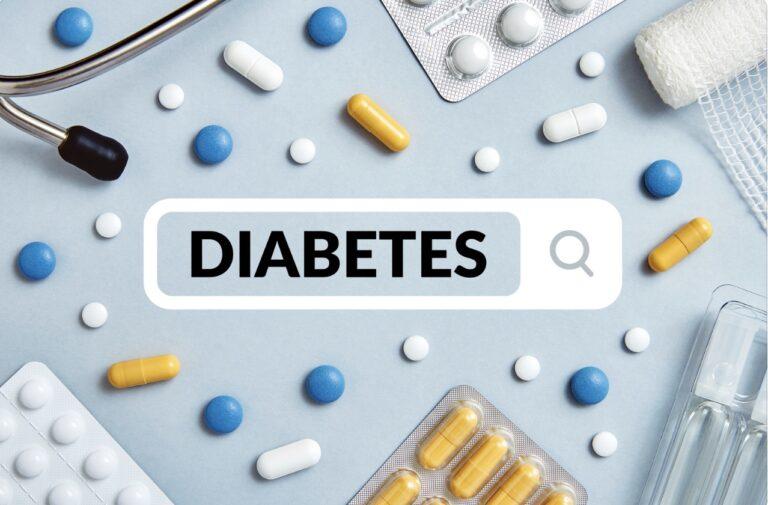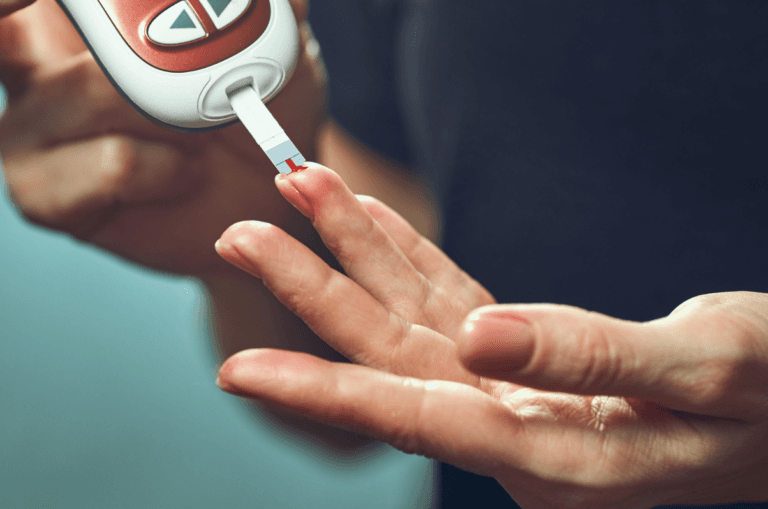
The NHS spends at least £10 billion a year on diabetes which is about 10% of its entire budget. In 2019/20 there were 57.7 million prescription items prescribed for diabetes treatment. Diabetes remains one of the top priorities for the NHS.
The key difference between type 1 and type 2 diabetes is that type 1 is an autoimmune disease while type 2 is a metabolic disorder. This means that type 1 diabetes cannot be prevented while type 2 diabetes can often be prevented through lifestyle changes such as eating a healthy diet and getting regular exercise. Let’s take a deeper look at the different causes, risk factors and complications associated with this disease.
What is diabetes?
Diabetes (Diabetes mellitus) is a condition that affects the way the body processes sugar. There are two forms of diabetes: type 1 diabetes and type 2 diabetes. Both types involve having too much sugar in the blood, but they differ in their causes, and how they develop and are managed.
The pancreas plays a vital role in all the various types of diabetes. The pancreas has three major roles:
- To produce digestive enzymes
- To produce insulin and secrete it directly into the blood
- To produce glucagon, which raises your blood glucose levels
If you want to understand diabetes, the only hormone you must understand is insulin. Insulin is a hormone that helps to regulate blood glucose levels. When you eat, your digestive system breaks down carbohydrates into glucose, which enters the bloodstream. In response, the pancreas produces insulin, which helps to move glucose out of the blood and into the cells, where it can be used for energy. This process helps to keep blood glucose levels from getting too high. High blood sugar is known as hyperglycemia. However, if there is too much insulin in the bloodstream, it can cause low blood sugar levels, leading to dizziness, sweating and shaking. This is known as hypoglycemia. For people with diabetes, this can be a serious health concern. That’s why it’s important to maintain a healthy balance of insulin in the body.
How are type 1 and type 2 diabetes diagnosed?
There are different types of tests used to diagnose diabetes:
- Glucose tolerance test. The glucose tolerance test is usually given to people who have symptoms of diabetes, such as excessive thirst and frequent urination. During the test, you will be given a sugary drink and then your blood will be tested for glucose levels. If your blood glucose level is higher than normal, it may indicate that you have diabetes
- Fasting blood glucose test. The fasting blood glucose test is typically used to screen for diabetes in people who don’t have any symptoms. To prepare for this test, you will need to fast for at least 8 hours before having your blood drawn. If your fasting blood glucose level is higher than normal, it may indicate that you have diabetes
- A simple blood test. This test measures the amount of glucose in your blood. If your glucose level is higher than normal, it could be an indication of diabetes
- The haemoglobin A1c (HbA1c) test. This is a blood test that provides information about a person’s average levels of blood sugar (glucose) over the past three months. The HbA1c test is used to help diagnose diabetes, monitor diabetes and to identify people who are at high risk for developing diabetes. The test is also used to see how well your diabetes is being managed. A high HbA1c level may mean that a person’s blood sugar levels are too high and that their diabetes is not under good control
Type 1 diabetes
Type 1 diabetes is a condition in which the body does not produce enough insulin, a hormone that is essential for regulating blood sugar levels. While type 1 diabetes can occur at any age, it is most commonly diagnosed in children and young adults. While there is no cure for type 1 diabetes, it can be managed through a combination of diet, exercise and insulin injections.
Type 1 diabetes tends to come on in the early stages of life, such as childhood, adolescence or occasionally early adulthood. In type 1 diabetes the symptoms come on dramatically.
The exact cause of type 1 diabetes is unknown but some likely causes are:
- An autoimmune disorder. In people with type 1 diabetes, the body’s immune system attacks and destroys the pancreas’ insulin-producing beta cells. Your immune system is designed to fight off infections and you can’t survive without it. That is fine when the body is responding to a real attack e.g a virus causing a cold. Unfortunately, some people have an over-sensitive or faulty immune system and mistake the pancreas as a danger, producing antibodies and attacking it, causing diabetes. As a result, these individuals must take insulin injections to control their blood sugar levels
- Abnormal characteristics on your chromosomes. People who develop type 1 diabetes more often have certain abnormal features on their genetic material that aren’t present in people who don’t get diabetes. This alone does not guarantee you will develop diabetes
- A virus. Exposure to something in your environment, most likely a virus can develop type 1 diabetes. Type 1 diabetes is associated with several viruses, but one in particular called Human Enteroviruses (HEVs) has the strongest body of evidence. This virus can enter our gut through poor hygiene or sanitation and is passed on by people who don’t wash their hands after using restroom facilities. We don’t yet know if or how an HEV infection could lead to type 1 diabetes. There are several possible theories under investigation
Type 2 diabetes
Type 2 diabetes is a chronic condition that occurs when the pancreas does not produce enough insulin or when the body’s cells become insulin resistant. When blood sugar levels are high, the body produces more insulin in an effort to bring them down. However, over time, the body can become resistant to insulin, and blood sugar levels can remain high.
Type 2 diabetes is a disease with a gradual onset rather than the severe emergency that type 1 diabetes can be. The symptoms of type 2 diabetes are mild at first, you may not notice them. There is a chance you may ignore these symptoms for years before they become bothersome enough to consult a healthcare professional. The stage before type 2 diabetes is called prediabetes.
No autoimmunity is involved in type 2 diabetes, so no antibodies are found. No virus is believed to be involved in the onset of type 2 diabetes, making it a very different kind of diabetes to type 1 diabetes.
Type 2 diabetes is typically caused by a combination of environmental risk factors that turn a genetic disposition to type 2 diabetes into a clinical disease, these include:
- Obesity. Obesity and the risk of type 2 diabetes are closely linked. Being overweight or obese is the leading cause of diabetes type 2. In fact, approximately 80 per cent of people with this form of diabetes are overweight or obese. Losing weight can help to reduce the risk of developing type 2 diabetes, and it can also improve blood sugar control in people who already have the disease. Even a small weight loss of 5-10 per cent can have significant health benefits. The best way to lose body weight is to focus on healthy eating and regular physical activity. By making these lifestyle changes, you can achieve and maintain a healthy weight, which can help to reduce your risk of obesity and type 2 diabetes
- Poor diet. Poor diet is one of the main factors putting you at a higher risk for type 2 diabetes. A healthy diet is an important part of a healthy lifestyle at any time, but is especially critical if you have type 2 diabetes. Eating the right foods can help control your blood sugar levels and improve your overall health. In general, healthy eating for type 2 diabetes means eating; Plenty of vegetables, fruits, whole grains, low-fat dairy products and lean protein sources; Limited amounts of saturated fat, salt, alcohol and sugary drinks; Regular meals throughout the day. Eating healthy foods can also help you to manage your weight, reduce your risk of heart disease and stroke and lower your cholesterol and triglyceride levels. If you have type 2 diabetes, healthy eating is especially important because it can help you to keep your blood sugar under control. By following a healthy lifestyle plan, you can help delay or prevent type 2 diabetes
- Family history and ethnicity. You’re two to six times more likely to get type 2 diabetes if you have a parent, brother, sister or child with diabetes. People from Black African, African Caribbean and South Asian (Indian, Pakistani, Bangladeshi) backgrounds are at a higher risk of developing type 2 diabetes from a younger age
- Physical inactivity. Physical inactivity is a major risk factor for type 2 diabetes. People who are physically inactive are more likely to develop insulin resistance and are also at an increased risk for other conditions that can lead to type 2 diabetes, such as obesity and high blood pressure. In addition, physical inactivity can make it more difficult for people with type 2 diabetes to control their blood sugar levels. Regular exercise can help to prevent or delay the development of type 2 diabetes by improving insulin sensitivity and helping to maintain a healthy weight. For people who already have type 2 diabetes, physical activity can help to improve blood sugar control and prevent complications
- History of gestational diabetes. Gestational diabetes is a type of diabetes that occurs during pregnancy. It is caused by the placenta, which produces hormones that can make the mother’s body resistant to insulin. This can cause high blood sugar levels, which can lead to complications such as premature birth and macrosomia (a condition in which the baby is too large). Gestational diabetes is a risk factor for developing type 2 diabetes later in life. Women who have had gestational diabetes are more likely to develop type 2 diabetes, especially if they are overweight or have a family history of the condition
- Polycystic ovary syndrome (PCOS). It is a condition that affects women of childbearing age. It is characterised by the presence of multiple cysts on the ovaries. PCOS is also associated with an increased risk of diabetes, particularly developing type 2 diabetes. The exact cause of PCOS is unknown, but it is thought to be related to insulin resistance. Treatment for PCOS typically involves a combination of lifestyle changes and medication. These changes can help to improve symptoms and reduce the risk of complications such as diabetes
People with type 2 diabetes are at increased risk for developing heart disease, stroke, heart attack, cardiovascular disease and other serious health problems. While people with type 2 diabetes can often manage their condition with lifestyle changes, some may also need medication such as metformin.
Complications of diabetes
When blood sugar levels are too high, it can damage the body in a variety of ways:
- Diabetic retinopathy is one of the most common complications of diabetes and is a leading cause of blindness. The condition occurs when high blood sugar levels damage the blood vessels in the retina, the delicate tissue at the back of the eye. In the early stages of diabetic retinopathy, there may be no symptoms. However, as the condition progresses, symptoms may include blurred vision, difficulty seeing at night and floaters. If left untreated, diabetic retinopathy can lead to severe vision loss and even blindness. People with type 2 diabetes are particularly at risk for developing the condition. It is important to get regular eye exams to catch the disease in its early stages. There is no cure for diabetic retinopathy, but treatment can help to slow its progression and preserve vision. With early diagnosis and proper treatment, many people with diabetic retinopathy are able to maintain their vision
- Kidney disease is a complication of type 2 diabetes. The kidneys play an essential role in filtering waste from the blood and removing excess fluid from the body. Over time, high blood sugar levels can damage the kidneys, making it difficult for them to function properly. People with diabetes are also at increased risk for developing high blood pressure, which can further damage the kidneys. As kidney function declines, waste products begin to build up in the blood, causing a condition called uremia. Uremia can lead to a number of serious health problems, including anaemia, bone loss and nerve damage. Treatment for kidney disease typically involves a combination of medication and lifestyle changes. In some cases, patients may need to undergo dialysis or receive a kidney transplant
- Neuropathy is a common complication of type 2 diabetes. It occurs when high blood sugar causes nerve damage resulting in pain, numbness and tingling. In severe cases, neuropathy can lead to loss of sensation in the extremities and even paralysis. While there is no cure for neuropathy, early diagnosis and treatment can help to prevent its progression. There are several risk factors for neuropathy, including poor blood sugar control, high blood pressure and smoking. People with diabetes should closely monitor their blood sugar levels and work with their diabetes care team to keep them under control. They should also be sure to keep their blood pressure under control and stop smoking if they smoke. If neuropathy does develop, there are treatments available that can help relieve symptoms and improve quality of life
- Diabetic ketoacidosis (DKA) is a potentially life-threatening complication of diabetes. It occurs when the body cannot produce enough insulin to regulate blood sugar levels. This can cause the body to break down fat for energy, producing ketones that build up in the blood and lead to a potentially dangerous condition known as acidosis. DKA is most often seen in people with type 1 diabetes, but it can also occur in people with type 2 diabetes, particularly if they are taking certain medications such as steroids or thiazolidinediones. While DKA can be treated through intravenous fluids and insulin therapy, it can be fatal if not properly managed. As such, it is vital for people with diabetes to be aware of the signs and symptoms of DKA and to seek medical treatment immediately if they suspect that they may be developing this condition
Diabetes is a serious and complex disease. It can be managed with good education and care from you and your healthcare professional. There are many different types of diabetes, each with its own set of complications. Speak to your healthcare professional for the best advice on how to manage your diabetes. Taking care of yourself by following a healthy diet and getting regular exercise will help keep you feel your best.
Sources
NowPatient has taken all reasonable steps to ensure that all material is factually accurate, complete, and current. However, the knowledge and experience of a qualified healthcare professional should always be sought after instead of using the information on this page. Before taking any drug, you should always speak to your doctor or another qualified healthcare provider.
The information provided here about medications is subject to change and is not meant to include all uses, precautions, warnings, directions, drug interactions, allergic reactions, or negative effects. The absence of warnings or other information for a particular medication does not imply that the medication or medication combination is appropriate for all patients or for all possible purposes.










